#cardinal mazarin
Text


Mazarin and d'Artagnan! like. listen. I'm reading Charles Samaran's book on d'Artagnan, and 'Colbert a dit que d'Artagnan fut une créature de Mazarin; rien n'est plus vrai,' sure was a sentence to read.

D'Artagnan, Capitaine des mousquetaires du roi, histoire véridique d'un héros de roman, Charles Samaran
society6 | ko-fi | redbubble | twitter (pillowfort, cohost) | deviantart
#d'Artagnan#cardinal mazarin#drawing tag#french history tag#ngl if anyone has any recs/pdfs they'd be willing to send my way on the historical figure of d'artagnan or 17th century french history#focusing on. like. this sort of thing. mazarin. richelieu. the man in the iron mask mystery. textbook recs. feel free to hit me up!#OH and politics ofc. im always interested in reading about politics. or anything else that could be interesting. my curiosity is broad.#ngl most of the english language texts on d'artagnan are about his book counterpart which is fun but not what im interested in rn#(and the texts don't need to be in english: i can read french)#WAHOO alright tags out of the way its been a hot second since ive made two posts here in one day
215 notes
·
View notes
Note
Would you put Louis XIV as overrated?
Oof, that's a tough one.
It's particularly hard to answer because the reign of the Sun King also saw the tenure of some of the most influential chief ministers in French history: Mazarin, and Colbert.
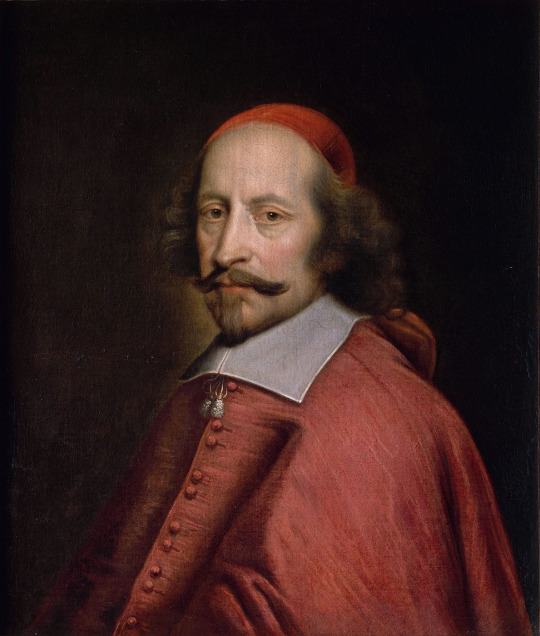
While perhaps not quite as famous as a certain cardinal whose schemes kept getting foiled by the Three Musketeers, these guys were world-historically important.
Mazarin was Richelieu's political heir, and brought his predecessor's policy of using the Thirty Years War as a way to break the back of Hapsburg dominance to a successful conclusion. The Peace of Westphalia not only served as the foundation for modern international relations, but also expanded France's position in Alsace and the Rhineland - especially when Mazarin pulled off an anti-Hapsburg alliance with the new League of the Rhine.
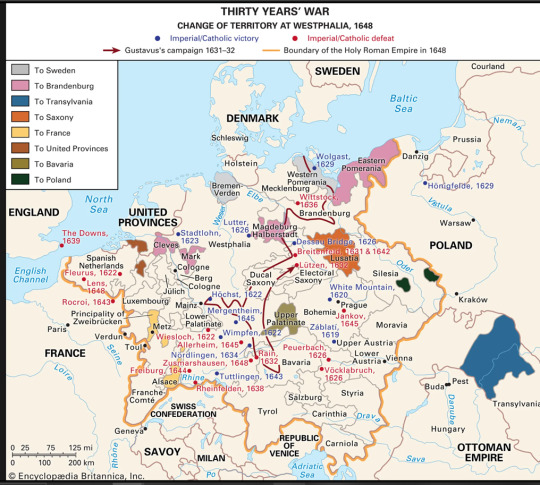
At the same time that France was winning the Franco-Spanish War, which won them a big chunk of territory in the Low Countries around Artois, Luxembourg, and parts of Flanders, and all of the territory north of the Pyrenees Mountains including French Catalonia. It also got Louis XIV the hand of Maria Teresa, which would eventually create the catalyst for the War of Spanish Succession and the War of Austrian Succession...
And while Mazarin was doing all of this, he was also busy crushing the Fronde uprising led by le Grand Condé, which he eventually accomplished in 1653, and creating a formidble system of centralized royal government through the intendants that ended the power of the feudal nobility.
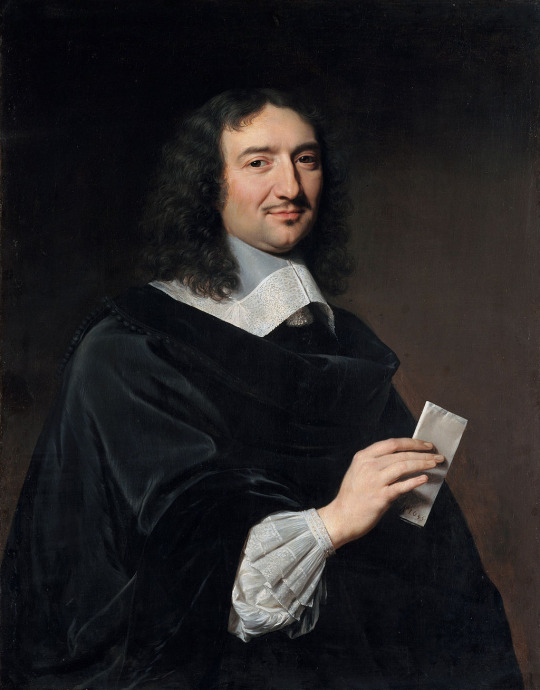
As for Colbert, he was the guy who figured out how to pay for all of this. The single biggest reason why economists need to shut the fuck up when they talk about mercantilism, Colbert was the financial and economic genius of his age. Remember all those canals I'm so crazy about? Colbert built them. Specifically, he was responsible for the Canal des Deux Mers, transforming France's economy by linking the Mediterranean to the Atlantic.

He also turbo-charged France's economic development by restructing public debt to reduce interest payments and cracking down on tax farmers, reforming (although not ultimately solving) the taxation system of the Ancien Régime by using indirect taxes to get around tax evasion by the First and Second Estate, equalizing (but not ending) internal customs duties, and putting the power of the state into supporting French commerce and manufacturing. This included significant tariffs to support domestic producers, direct public investments into lace and silk manufacturing, and the creation of joint-stock corporations like the French East India Company. (This also meant Colbert's direct promotion of the slave trade and the Code Noir in order to generate hugely profitable investments in Haitian sugar and tobacco plantations for import into France and the rest of Europe.)
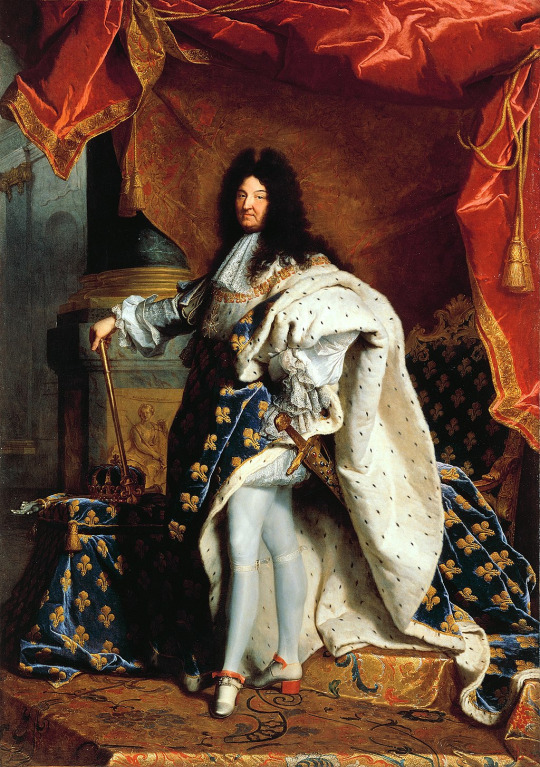
This makes it a little difficult to separate out what credit belongs to these guys versus the guy who hired them. What I can say is that Louis was directly responsible for Versailles, but also for the revocation of the Edict of Nantes.
#history#historical analysis#cardinal richelieu#cardinal mazarin#jean baptise colbert#louis xiv#versailles#french history#early modern history#economic development#mercantilism#political economy#early modern state-building#early modern period#early modern europe
29 notes
·
View notes
Text
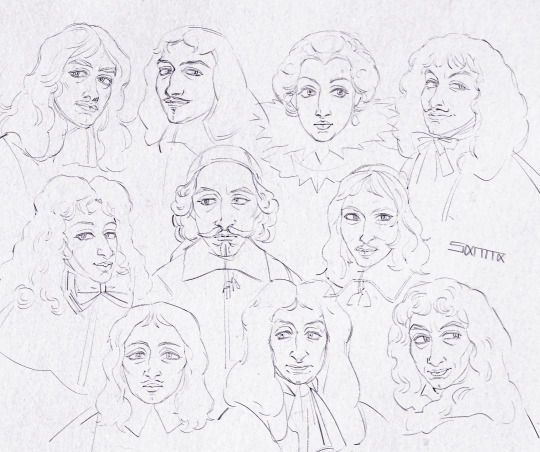
A series of mini portraits
#artists on tumblr#digital art#drawing#digital drawing#digital sketch#sketch#portrait#portrait drawing#Charles Perrault#Jean-Baptiste Colbert#Anne of Austria#King Louis XIV#Philippe I Duke of Orléans#Cardinal Mazarin#Nicolas Fouquet#Jean de La Fontaine#Claude Perrault#I'm so tired#Louis XIV
15 notes
·
View notes
Text
Ministerial tactics
It should be noted that Richelieu did not launch a general attack upon the great nobles of France or attempt to undermine the importance of provincial governorships. Neither did he launch a general attack upon great noble clienteles or attempt to destroy them. As Georges Pagès has remarked, "Richelieu did not destroy clienteles; he himself had a client network which grew larger and more obedient until the end of his life, and was used against his enemies. But in obliging the grands to obey, he put their clienteles in the service of the king." Richelieu did not have the resources to destroy the clienteles of the great nobles of France, and the disruptive repercussions of such an assault might have boomeranged back upon his own clientele, which he needed in governing. Richelieu and his successors, Mazarin and Colbert, used administrative clienteles and the brokerage of royal patronage in the provinces to strengthen royal control over provincial power structures and to counter the influence of unreliable governors. The royal ministers did not attempt to destroy the great nobles and their clienteles, which would have been difficult to do, anyway. They encircled, undermined, and co-opted them using the lure of royal patronage to achieve the same effect. Co-optation through patronage is a classic method of forestalling dissent, weakening resistance, and securing cooperation. The tactic of using brokers and brokerage leads us to reassess how the early modern state was created, how it functioned, and how it secured its power. The Bourbon monarchy had a broader base of support among the nobility than we have realized.
Sharon Kettering - Patrons, Brokers and Clients in Seventeenth Century France
#xvii#sharon kettering#patrons brokers and clients in seventeenth century france#cardinal de richelieu#cardinal mazarin#jean-baptiste colbert
7 notes
·
View notes
Text
read this book (in a fruitless attempt) to better understand the details of the thirty years’ war and the author gets her digs at these people at every chance she gets:
“In the Louvre the King [Louis XIII] lay on his huge bed day after day, but his unhealthy body, which had for the last years never seemed truly alive, was unable to die. The pulse beat obstinately on in the wasted skeleton. Day after day he lay almost motionless, sometimes sinking into troubled sleep, sometimes half-conscious, sometimes speaking, while his wife cried noisily at his bedside.”
“Richelieu, though never popular, had evoked a certain apprehensive admiration. The people did not feel the same about Cardinal Mazarin. The dapper little Sicilian with his petty personal vanities, his childlike ostentation, his delight in craft and cunning, had few impressive qualities. Equally he had not the comprehensive genius of Richelieu; he never understood or managed to control the internal politics of France.”
“Philip IV, having lost both his wife and only son within a few weeks of each other, began, with indecent haste, to seek out a young bride; he was not a very prepossessing husband, old and glum for his forty-odd years, dumbly stupid; as a ruler, a useless idol. He was devoted only to his one remaining child, the scatter-brained little Infanta who was despite the formalities of Madrid and the splendours of Versailles remained through life a foolish, impulsive, perpetually sweet-tempered schoolgirl.”
#'his wife cried noisily at his bedside'#history#french history#spanish history#quotes#i do think it's a well-written and extremely comprehensive book#however#there are too many ppl to keep track of#and many of them either have the same name. similar names. or multiple names/titles#the book is The Thirty Years' War by C.V. Wedgwood#it's from like 1939#which adds an interesting flavor to her perspectives on war i think#shannon says#louis le juste#anne d'autriche#philip iv#cardinal richelieu#cardinal mazarin#c.v. wedgwood
11 notes
·
View notes
Text

400 year old tea SPILLING
#I've read about a LOT of morganatic marriages and I've NEVER heard of this!#the fronde#cardinal mazarin#anne of austria
1 note
·
View note
Photo

28 juin 1669 : établissement de l’opéra en France ➽ http://bit.ly/Creation-Opera L'opéra naquit en Italie vers la fin du XVe siècle, ou le commencement du XVIe. C'est le cardinal Mazarin, qui le premier tenta de l'importer en France
#CeJourLà#28Juin#opéra#cardinal#Mazarin#abbé#Perrin#académie#musique#théâtre#chantant#histoire#france#history#passé#past#français#french#news#événement#newsfromthepast
9 notes
·
View notes
Photo










Giulio Raimondo Mazzarino + his cats
#jules mazarin#les trois mousquetaires#the three musketeers#vingt ans après#la reine et le cardinal#giulio mazzarino#cardinal richelieu#cats#anne d'autriche#richelieu would have been proud#anne of austria
43 notes
·
View notes
Video
youtube
#Becoming Elizabeth#Edward Seymour#Edward Seymour Duke of Somerset#Mary Tudor#Mary I Tudor#Mary I#John Heffernan#Romola Garai#period drama#becomingelizabethedit#perioddramaedit#periodedits#tudoredit#fanvid#my videos#the Queen and her Knight trope to your door!#...or is it the Queen and the Grey Cardinal?#well at least the guy is certainly no Mazarin#unmarried Somerset!AU - Edward Tudor dies before Henry!AU - you know the drill#masking was never an option#shaking camera is evil
16 notes
·
View notes
Text
The Mazarin Stone
First published in 1921, this was an adaptation of a one-act play Doyle wrote called The Crown Diamond: An Evening with Sherlock Holmes that ran in London that same year and featured Sebastian Moran.
It is also written in the third person, rare for a Holmes story.
A gasogene was a two-globed late Victorian device for producing sparkling water or other such carbonated beverages; the liquid was placed in the bottom and a mixture of tartaric acid and bi-carbonate of soda at the top. You tipped it slightly to start the process going. They had a habit of exploding under pressure, so were in a wire or wicker mesh to stop glass flying around if they did.
Cardinal Mazarin (1602-1661) was Chief Minister to Louis XIII and XIV from 1642 until his death. Succeeding Cardinal Richelieu of The Three Musketeers fame, he proved a hugely effective diplomat, playing a key role in the Treaty of Westphalia of 1648, whose principles of national sovereignty remain key to modern international relations.
He acquired a massive art, literature and jewel collection as well, leaving eighteen diamonds called "the Mazarins" to Louis XIV on his death.
Air guns with a pellet discharge of under 12ft/lb are today legal to own in the UK without a licence - anything over that is legally a firearm and regulated as such i.e. licences are needed.
A gudgeon is one of many small bottom-dwelling fish.
Algeria had been gradually conquered by France between 1830 and 1903, become an integral part of the country; something most colonies did not have happen to them. It also gained a very large number of European settlers.
"Train-de-luxe" referred to a train exclusively made up of CIWL carriages, all of which were pretty luxurious with the obvious exception of the dedicated luggage vans. The Orient Express was one such train for much of its history.
"It's a fair cop" is a British slang expression meaning "it was wrong and you caught me fairly".
31 notes
·
View notes
Note
hello! i have discovered ur blog and i am absorbing everything like a sponge i love the rambles and interpretations i am obsessed...
i enjoy the character rambles the most and i was just wondering how you feel on Margaret and her character? I feel like her only fan on this entire planet... i need to hear someone speak about her in some kind of depth to a degree, her lore, how they see her potentially Cope™, etc. its tough being a margaret enjoyer when nobody seems to give too much of a care about her </3 i feel like she deserved better if i make sense!!!
have a nice day/evening/night/morning🔥🔥🔥
Oh Light, this is so sweet... I'm actually feeling a little guilty because long-time followers will know I'm definitely not a Musketeer person lol But for you only, OP, I will try to cook up something.
To be totally transparent here, my beef is how her premise was utilized. First, as alt skin for the Arbalest (watch as I force myself not to rant about THAT particular choice) and second, her general character focus.
Someone who pierced through the veil of reality by complete accident has potential to be an interesting character! But her barks lean heavily on the "aristocratic huntress" thing, which is not the way I would go in a game about broken souls (also it kinda steps on Audrey's toes). Make her sound a little more obsessed, a little more haunted, hint at the fact that maybe, just maaaaybe, seeing what she was never meant to changed her forever. Make her "hunt" less of a choice to soothe her pride over one competition (srsly) and more of an irresistible pull from the very Heart of Darkness. NOW we can talk.
Let's add this too: when she gazed at the abyss, did the abyss gaze back? Eyes in Darkest Dungeon are a symbol of awareness of the horror of reality and it was an eye she found at the other side of her gun. If the thing saw her, did it only see an ant? Did it see food, something to draw into the trap that is the Hamlet? Or does it have another purpose?
In this reading, I would put her in the same category as Sarmenti and Amani as people who never had any intention to reach out to the occult but have a natural inclination to fiddle with it... Maybe even attract the eldritch? Imagine how disturbing, to be the one the most unnatural monsters like to swarm to. In a bad timeline, she could have been a cultist witch.
Besides, with a title like Musketeer, we could stand to give her more grit. Ok, she's a competitive shooter, but musketeers were military units. It's possible they wanted to avoid overlap with other military heroes, especially Arbalest, but that wouldn't be a problem if her uniqueness was emphasized in other ways. Notably, the French musketeers were an elite unit that served both as royal guard and in open battle. I know Butcher's Circus tried to differentiate her, but what if instead of backline healing (which doesn't resonate with her theme) she got a guard skill and a few lines about serving some noble house? It would be a way to give her a bit more of a storied past. She directly references The Three Musketeers, for goodness' sake, make her reference some adventures! Intrigue, romance! Maybe a Cardinal Mazarin expy, why not!
To end, can I someone please tell me what her hair color is meant to be? The portrait is blonde, her full body art is redhaired, the Butcher's Circus art leans brunette/auburn. I know consistent design does not exist in Darkest Dungeon but. At this point I'm headcanoning that she dyes it a different color every time to cover early gray hair from the Horrors. She's the only one who has a grey haired alt skin, IIRC.
24 notes
·
View notes
Text
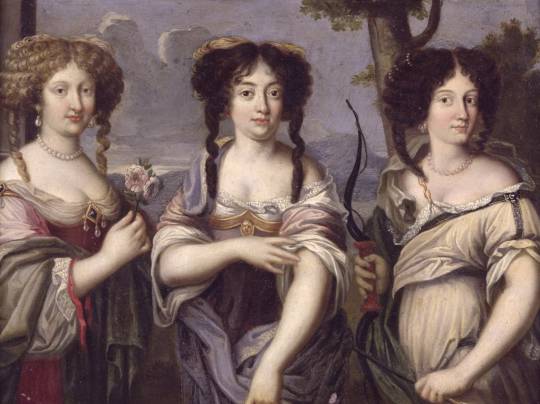
Anonymous Triple portrait of women or Portrait of three of the nieces of Cardinal Mazarin portrayed as goddesses Venus Juno and Diana 17th c
30 notes
·
View notes
Text
Anne of Austria and Mazarin: a more nuanced reading.
The question of the queen mother’s relationship with Mazarin has been the stuff of historical speculation since the mazarinades first spread notions of illicit sexual relations, secret marriage, and the cardinal’s ‘bewitching’ of the queen. Since then, slightly more decorous historical discussion has sought to establish the nature of the relationship, with the obvious underlying question of how emotionally dependent Anne was on Mazarin. Much of this relies on reading meanings into letters from Mazarin to Anne whose tone and expression could encompass the possibilities of frustrated physical passion, heightened seventeenth-century notions of sentiment and friendship, calculated emotional manipulation, and a great deal in between these three. The relevant question in this context is whether the queen mother could contemplate abandoning Mazarin and leaving him in permanent exile, either because the emotional ties were less strong than Mazarin wished to believe, or because Anne calculated, on behalf of her son, that the political price —or political risk— of restoring the cardinal was too high. Here the only real source, given the queen’s own silence, are the memoirs of contemporaries around her at court, and opinions in these are divided. If some of these writers assert that Anne would never abandon Mazarin, others were quite prepared to argue that the queen’s affections were conditional and perceptibly diminishing as Mazarin’s absence continued. A third group did not doubt Anne’s affection for the cardinal, but were more sceptical of her resolution and commitment to him in the face of persuasion and contrary arguments advanced by those in her entourage and in the council.
Some of the shrewdest commentary can be found in the memoirs of Marie d’Orléans, duchesse de Nemours, who was not an intimate of Anne like Mme de Motteville, but no enemy of the queen either. Nemours’ memoirs assert that commentators had been so obsessed with the notion that the queen was entirely controlled by Mazarin that they had failed to note just how little correspondence there was between the two of them, and the amount of mutual misunderstanding that grew up during Mazarin’s exile. The queen mother, she argued, had little taste for the work of government and little confidence that she could handle it well; despite this, Nemours adds, she had a good sense of political judgement based on scepticism about the motives of everyone. So it suited the queen to allow Mazarin to take responsibility for government, but when he was not present she was prepared to take the advice of others around her, even when this cut across the actions and policies that she had previously agreed with the cardinal. This interpretation of the queen’s motivation was not good news for Mazarin’s aim to shape Anne’s actions on the basis of his intermittent correspondence. And it was echoed by two of Mazarin’s strongest advocates at court: his nephew by marriage, the duc de Mercoeur, and his military ally, the maréchal du Plessis-Praslin. Both stressed that the queen was, in Mercoeur’s words, ‘susceptible to being pressured’ by those ministers and courtiers with whom she was more immediately in contact.
These pessimistic judgements were not fully accepted by Mazarin, but he was certainly concerned that Anne might get used to managing affairs of state without him. It was not possible to insulate the queen mother from those around her, and many of them were either his undeclared enemies or those who believed that Mazarin’s return would complicate an already precarious political situation. His response, as we have seen, was to keep his return as the unremitting focus of all his letters, while simultaneously expecting his allies and appointees in the council and at court to maintain the pressure on the queen by stressing the miseries of his exile and the benefits that would be brought by his presence.
All of this took its toll: Mazarin was prepared to confront the queen directly about the extent of her commitment to him, and his replies suggest that he received some written reassurances from Anne in return. But he was no less aware that even the most detailed and painstakingly written account of the political situation and the role she should play was less immediately influential than direct conversation with the queen. Unless he could count on those around Anne to remain ‘on message’, his letters could easily be forgotten; and many of these courtiers saw Mazarin’s stock as having fallen to the point where his concerns could be ignored with impunity. An additional hazard in trying to build up a group of cheerleaders around the queen came from Anne’s suspicions that Mazarin’s letters to others in the court circle may have offered different perspectives and information from those sent to her personally. The duc de Mercoeur explained in a letter to Mazarin that the queen insisted that all those at the court who received letters from Mazarin should read them out to her in her apartments. Mercoeur recognized that this had the potential to embarrass Mazarin, if not worse, and suggested that the cardinal should send information that he did not want disclosed to the queen in separate, additional notes that could be kept apart from the letter for public consumption.
David Parrott - 1652: The Cardinal, the Prince, and the Crisis of the Fronde
#xvii#david parrott#1652: the cardinal the prince and the crisis of the fronde#cardinal mazarin#anne d'autriche#marie d'orléans#madame de motteville#duc de mercoeur#maréchal du plessis-praslin
3 notes
·
View notes
Text
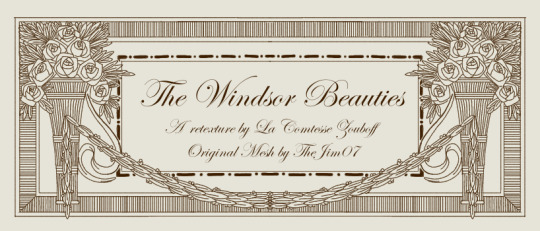

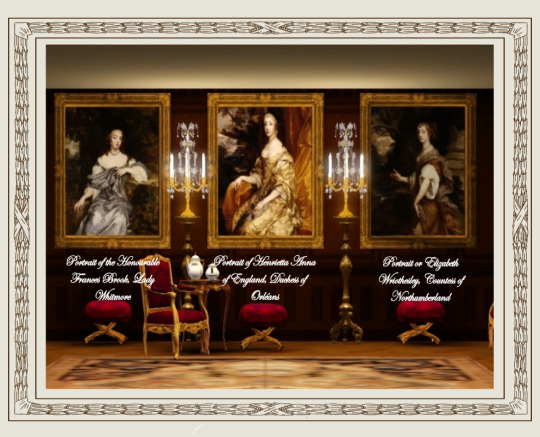
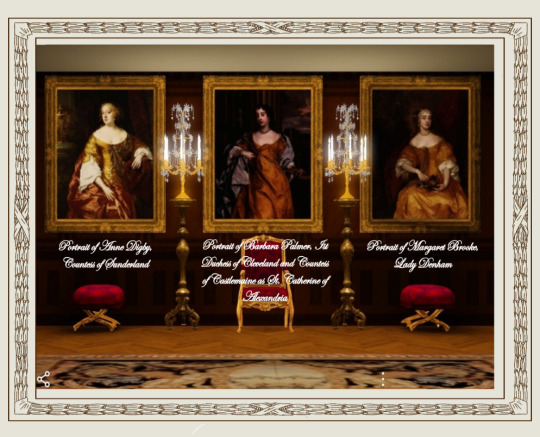

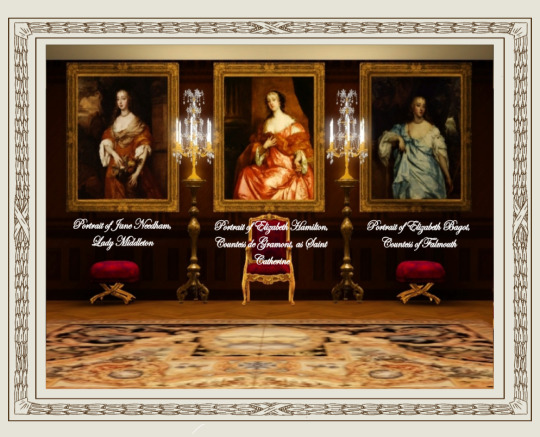
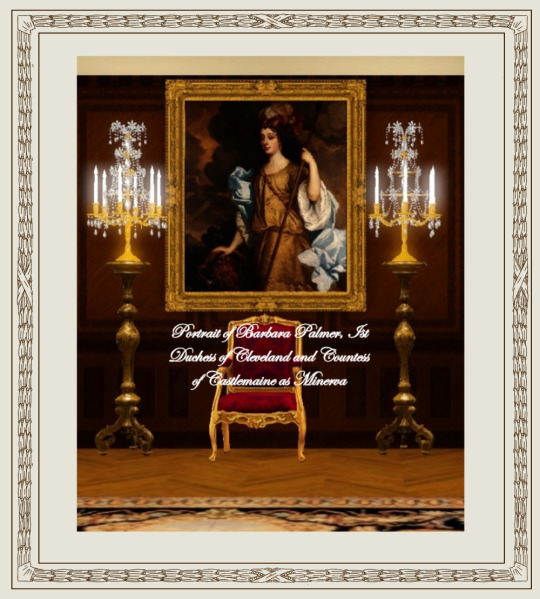

The Windsor Beauties Set
A retexture by La Comtesse Zouboff — Original Mesh by @thejim07
The Windsor Beauties are a set of portrait paintings, still in the Royal Collection, by Sir Peter Lely and his workshop, produced in the early to mid-1660s, that depict ladies of the court of King Charles II, some of whom were his mistresses. The name stems from the location of the collection, which was at Windsor Castle.
Originally commissioned by Anne Hyde, Duchess of York, the first mention of the paintings is by Samuel Pepys, describing them in his diary as being hung in "the Duke of York's room" in 1668. A 1674 inventory lists them as in the ducal rooms at St. James Palace and by 1688 they had moved to the "Princess's dressing room" at Windsor Castle. Moved to the castle's state rooms during the 18th century, the Windsor Beauties were transferred to Hampton Court at some time prior to 1835.
They are considered the pinnacle of restoration art and are regarded as one of Lely's most exquisite work.
The set includes 13 portraits, with the original frame swatches, fully recolorable. The portraits are of:
Anne Digby, Countess of Sunderland
Anne Hyde, Duchess of York and Albany
Barbara Palmer, Ist Duchess of Cleveland and Countess of Castlemaine as Minerva
Barbara Palmer, Ist Duchess of Cleveland and Countess of Castlemaine as St. Catherine of Alexandria.
Elizabeth Bagot, Countess of Falmouth
Elizabeth Hamilton, Countess de Gramont as Saint Catherine
Elizabeth Wriothesley, Countess of Northumberland
Frances Theresa Stewart, duchess of Richmond and Lennox
Henrietta Anne of England, Duchess of Orléans
Henrietta Hyde, Countess of Rochester
Jane Needham, Lady Middleton
Margaret Brooke, Lady Denham
The Honourable Frances Brook, Lady Whitmore
Found under Decor > Paintings for 1.650 §
Retextured from "Portrait of Cardinal de Mazarin" found here
Chairs, stools, side table and bronze "Pendule á Cercles Tournants" by @joojconverts
Walls, floor, torchere, girandole and table by @thejim07
Tea pot, milk jugar, sugar bowl and teacup by @aroundthesims
White vase by @martassimsbookcc
Rug by me (to be released)

(Drive)
(Sims3pack and Package)
(Useful tags below)
@joojconverts @ts3history @ts3historicalccfinds @deniisu-sims @katsujiiccfinds
-------------------------------------------------------
#the sims 3#ts3#sims 3 cc#sims 3#s3cc#sims 3 download#portrait#sims 3 paintings#retextures#La Comtesse Zouboff#baroque#englishbaroque#windsor castle#windsor beauties#sir peter lelly#sims 3 decor#historical cc find#sims 3 art#wall decor
65 notes
·
View notes
Text
OH COME ON?!

First Alexandre is being a jealous, little bitch and then Louis overhears us ?! Fuck you Alexandre, Renée has just managed to bag the King and you ruined it already 😤


Oh no 😭 idk why but that handkerchief is making me emotional 😭


🤣🤣 I love Renée so much. The king can basically condemn her to death or to perpetual exile for this and she's still annoyed that she could be called a shitty spy or a shitty liar 🤣. Never change Renée.


One of the many things I like about this story is how they're showing the consequences the Fronde had on French Aristocracy - especially on Louis who was a small child when it happened - and how it changed the direction of the country. It truly informed Louis' ruling style which became absolutist. There have been pushes since Henri IV (Louis' grandfather) to concentrate more power into the king's hand but after the Fronde was defeated (which was a parliamentary and nobility revolt to check the royal power) there was nothing standing in Louis' way to make his rule absolute. He was the first french monarch to rule without a prime minister, after the death of Cardinal Mazarin. It caused quite a stir when he announced it as he was so young to rule on his own.

Have to agree with Louis here, she could have ended in the Bastille for this. This scene hurt me so much 😭

Well, this day can be called Renée's terrible, horrible, no good, very bad day.
#ep 5 from s1 really wasn't in renée's favor when you're a louis romancer#rc vying for versailles#romance club#rc louis xiv
17 notes
·
View notes
Photo

28 juin 1669 : établissement de l’opéra en France ➽ https://bit.ly/3FBDneB L'opéra naquit en Italie vers la fin du XVe siècle, ou le commencement du XVIe. C'est le cardinal Mazarin, qui le premier tenta de l'importer en France
#CeJourLà#28Juin#opéra#cardinal#Mazarin#abbé#Perrin#académie#musique#théâtre#chantant#histoire#france#history#passé#past#français#french#news#événement#newsfromthepast
2 notes
·
View notes